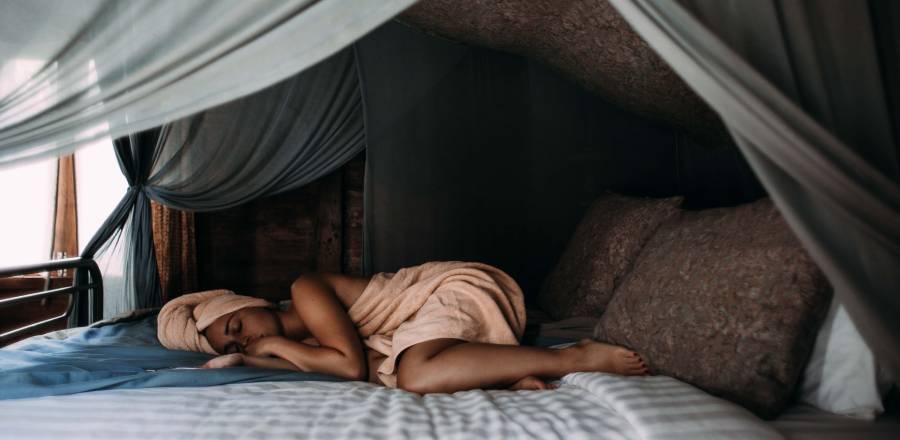Do you struggle with falling asleep at night? Do you find yourself tossing and turning, unable to quiet your mind? You’re not alone. Millions of people worldwide suffer from insomnia, which can have a serious impact on your health and well-being. Fortunately, there are steps you can take to relax your mind and fall asleep faster. In this article, we’ll explore the best techniques for relaxing your mind to sleep, from breathing exercises to meditation, and everything in between.
Before we dive into techniques for relaxing your mind to sleep, it’s important to understand the science of sleep. Sleep is a complex process that is essential for our physical and mental health. During sleep, our bodies repair and regenerate, and our brains consolidate memories and process information. Sleep also helps regulate our hormones, which are essential for maintaining a healthy immune system, metabolism, and mood.
There are two main types of sleep: non-rapid eye movement (NREM) sleep and rapid eye movement (REM) sleep. NREM sleep is divided into three stages, with each stage characterized by different brain wave patterns. During NREM sleep, our bodies relax and our breathing slows down. REM sleep, on the other hand, is characterized by rapid eye movements and more active brain activity. This is when we typically experience vivid dreams.
Table of Contents
The Importance of Relaxing Your Mind to Sleep
Relaxing your mind before bedtime is essential for falling asleep faster and achieving restful sleep. When we’re stressed or anxious, our bodies release the stress hormone cortisol, which can interfere with our ability to fall asleep and stay asleep. By relaxing your mind before bedtime, you can reduce the amount of cortisol in your system and promote the release of the sleep hormone melatonin.
Relaxing your mind can also help reduce the symptoms of conditions such as anxiety and depression, which can interfere with sleep. By practicing relaxation techniques regularly, you can improve your overall mental and emotional well-being, which can have a positive impact on your sleep quality.
Techniques for Relaxing Your Mind to Sleep
a. Deep Breathing
Deep breathing is a simple and effective way to calm your mind and body before bedtime. To practice deep breathing, sit or lie down in a comfortable position and take slow, deep breaths through your nose. Focus on filling your lungs with air, and then slowly exhale through your mouth. Repeat this for several minutes, and focus on the sensation of your breath moving in and out of your body. You can also try counting your breaths, or visualizing a peaceful scene to help you relax.
b. Progressive Muscle Relaxation
Progressive muscle relaxation is a technique that involves tensing and then relaxing different muscle groups in your body. This can help release physical tension and promote relaxation. To practice progressive muscle relaxation, start by tensing the muscles in your toes and then releasing the tension. Move up your body, tensing and then releasing each muscle group. You can also combine this technique with deep breathing for even greater relaxation.
c. Visualization
Visualization involves using your imagination to create a peaceful and calming mental image. This can help distract your mind from worries and promote relaxation. To practice visualization, close your eyes and imagine yourself in a peaceful setting, such as a beach or a forest. Use your senses to imagine the sights, sounds, smells, and textures of this setting. Focus on the details and try to immerse yourself in the experience. You can also use guided imagery scripts or recordings to help you visualize and relax.
d. Mindfulness Meditation
Mindfulness meditation is a form of meditation that involves focusing your attention on the present moment, without judgment. This can help reduce stress and promote relaxation. To practice mindfulness meditation, sit or lie down in a comfortable position and focus your attention on your breath. When your mind wanders, gently bring your attention back to your breath. You can also try body scan meditation, where you focus your attention on different parts of your body and notice any physical sensations without judgment.
e. Yoga
Yoga is a form of exercise that combines physical movement with mindfulness and relaxation. Certain yoga poses, such as child’s pose or corpse pose, can be particularly helpful for promoting relaxation and preparing your body for sleep. You can also try incorporating breathing techniques or guided meditation into your yoga practice.
f. Aromatherapy
Aromatherapy involves using essential oils to promote relaxation and reduce stress. Lavender, chamomile, and bergamot are popular essential oils for promoting relaxation and sleep. You can use essential oils in a diffuser, add them to a warm bath, or apply them topically (diluted with a carrier oil) before bedtime.
g. Journaling
Journaling can be a helpful way to process your thoughts and emotions before bedtime, which can reduce racing thoughts and promote relaxation. Write down anything that’s on your mind, without judgment or censorship. You can also try gratitude journaling, where you write down things you’re grateful for each day.
h. White Noise
White noise, such as the sound of a fan or a white noise machine, can be helpful for masking background noise and promoting relaxation. You can also try listening to calming music or nature sounds before bedtime.
Creating a Sleep-Conducive Environment
In addition to practicing relaxation techniques, it’s important to create a sleep-conducive environment. This includes:
- Keeping your bedroom cool, quiet, and dark
- Using comfortable bedding and pillows
- Avoiding electronics before bedtime
- Creating a bedtime routine and sticking to it
- Avoiding caffeine and alcohol before bedtime
Tips for Maintaining Good Sleep Hygiene
In addition to practicing relaxation techniques and creating a sleep-conducive environment, there are several other tips for maintaining good sleep hygiene, such as:
- Getting regular exercise (but avoiding vigorous exercise before bedtime)
- Maintaining a regular sleep schedule
- Limiting naps during the day
- Avoiding large meals before bedtime
- Managing stress through healthy coping mechanisms (such as exercise, meditation, or therapy)
When to Seek Professional Help for Sleep Issues
If you’re consistently struggling with falling asleep or staying asleep, despite making changes to your sleep hygiene and practicing relaxation techniques, it may be time to seek professional help. A sleep specialist can help diagnose and treat underlying sleep disorders, such as sleep apnea or restless leg syndrome. A mental health professional can also help address any underlying mental health concerns that may be interfering with your sleep.
Conclusion
Relaxing your mind to sleep is essential for achieving restful, restorative sleep. By practicing relaxation techniques, creating a sleep-conducive environment, and maintaining good sleep hygiene, you can improve your sleep quality and overall health and well-being. Remember, everyone’s sleep needs are different, so it may take some trial and error to find what works best for you. Be patient and persistent in your efforts, and don’t hesitate to seek professional help if needed. With the right tools and strategies, you can enjoy a good night’s sleep and wake up feeling refreshed and energized. Sweet dreams!





